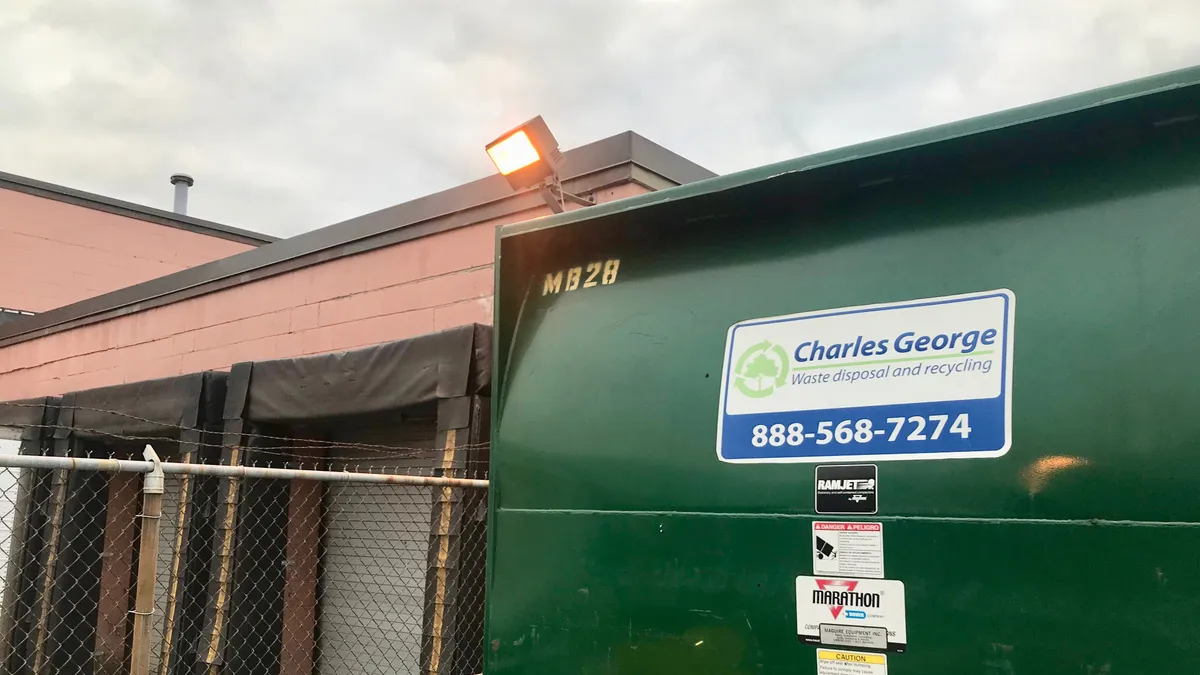Dive Brief:
- Wheelabrator Technologies recently acquired Charles George Companies (CGC), a family-owned and operated service provider, according to multiple local sources and public records. Wheelabrator has since confirmed the deal closed on July 1, noting this represents its entry into collection operations for New Hampshire and Massachusetts. Financial terms were not disclosed.
- New Hampshire-based CGC was founded in 1959 and was on its third generation of family leadership with President Christopher Karras, who did not respond to a request for comment. The company's operations include a transfer station, MRF and range of collection services.
- "I would like to welcome CGC and its employees into our Wheelabrator Family," said Wheelabrator President and CEO Bob Boucher in a statement to Waste Dive. "The company has grown substantially in recent years beyond transport and sustainable waste removal to include a variety of waste management, sorting and recycling services across New England. We appreciate the confidence the family has placed in us to run their business in the future under the guidance of Wheelabrator management."
Dive Insight:
This deal comes after a long period of speculation about future waste industry expansion plans for Macquarie Infrastructure & Real Assets (MIRA), which acquired Wheelabrator in February 2019 shortly after it had begun discussing the possibility of an initial public offering. That same month, (as originally reported by Waste Dive) MIRA also acquired Tunnel Hill Partners and its subsidiary City Carting & Recycling. This combination of the second-largest waste-to-energy company and largest integrated waste-by-rail company in the United States created a sizable player with a team of 1,700 employees.
According to New Hampshire-based Wheelabrator, that combined operation now encompasses the ownership or operation of around 40 "strategically located assets" in the U.S. and U.K. Based on a March presentation, this covers 20-plus incinerators and waste fuel facilities, four ash monofills, three landfills, nine transfer stations, two MRFs and collection accounts for a combined 20,000-plus customers in New York and Connecticut.
Since early 2019, the companies have worked toward an integration plan that saw the recent exit of Tunnel Hill CEO John Lamanna and the installation of a largely new executive leadership team in late 2019. Boucher, CEO of Wheelabrator since 2015, now runs the entire operation. While the company was previously part of a larger network under the longtime ownership of Waste Management — which sold it to Energy Capital Partners in 2014 — industry sources view this latest strategy as a much more focused push for vertical integration.
The 2019 expansion marked the latest of many waste industry ventures for MIRA, which has been backing companies in the sector through various Macquarie Infrastructure Partners funds since the early 2000s. According to comments from MIRA Managing Director Paul Mitchener in a 2019 Waste Today profile, the company views the industry similarly to many of its other infrastructure investments and sees ample opportunities for expansion. MIRA's previous waste investments include Waste Industries and GFL Environmental (divested in 2017 and 2018, respectively), and it maintains a stake in WCA Waste.
MIRA did not comment for this story, but Wheelabrator noted "plans for future growth." With the acquisition of CGC, Wheelabrator is picking up a company it described as "well-known for delivering high-quality customer service" – a sentiment shared by multiple sources in the region – and one with attractive assets.
Started as a trucking business by Charles George Sr. in 1959, the company increased its focus on waste under the second-generation leadership of Karen George. The original company previously ran a landfill in Massachusetts, which is now a Superfund site that resulted in expensive settlements with multiple governments agencies, according to a 2003 Boston Globe article. Per that article, Karras and his brother launched the current iteration of CGC in 1996 and led the expansion into its current form. This included the acquisition of Massachusetts-based North Side Carting in 2017, according to the Saugus Advertiser.
CGC's operations include a fleet of 75 trucks based in Londonderry, New Hampshire (according to federal records), a transfer station handling both MSW and C&D in Massachusetts and a 30,000-square-foot MRF focused on fiber in Massachusetts. The company is known for its strong position in roll-off and compactor work around the Greater Boston area, including an account with at least one sizable regional grocery chain. According to new data from the U.S. Small Business Administration, which approved a Paycheck Protection Program loan of between $2-5 million for CGC, the company had 125 employees as of early April.
Wheelabrator's new push comes as disposal capacity continues to shrink in the Northeast, a market which MIRA's Mitchener described as "on the cusp of change" at a 2019 industry event, and options are becoming more limited for haulers that aren't vertically integrated.
This has made exporting tonnage westward an increasingly viable proposition, as seen so far this year with the competitive acquisition of a Massachusetts rail transfer operation by Republic Services and the purchase of an Ohio landfill company by New Jersey-based Interstate Waste Services. While New Hampshire still has more disposal capacity left than some states in the region, the same cannot be said for Massachusetts. Wheelabrator's ability to export volumes to the Tunnel Hill landfills in Ohio, or use any available capacity at its local incinerators, will be a key strategic advantage for the integration of CGC and any future hauling acquisitions.















